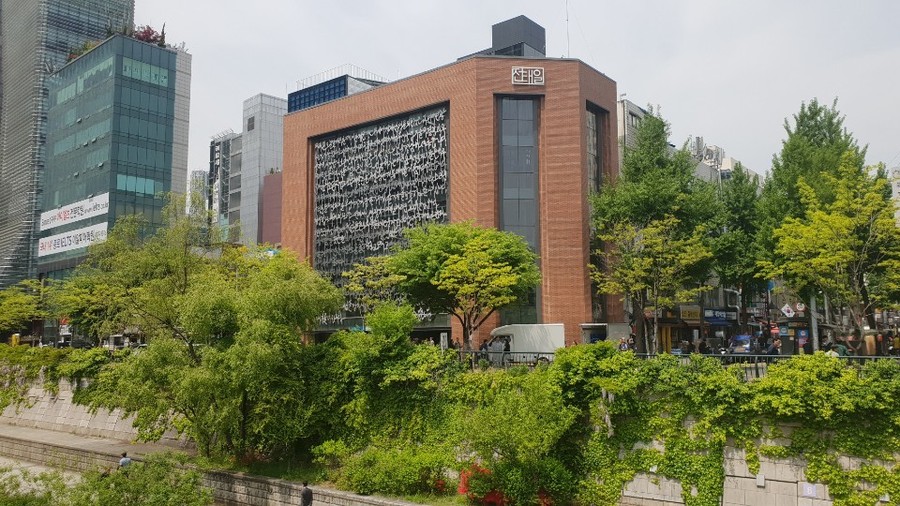 |
|
The Chun Tae-il Memorial in Seoul
|
Chun Tae-il sacrificed his life for workers’ rights, setting himself on fire at age 22
The huge screen blocking the building was cleared away, revealing an inscription that nearly covered the entire wall: “Your young children, not yet full-grown, have become grist for the mill of our economic development, doing grueling work for 15 hours a day. The women working in the clothing industry are 18 years old on average. [. . .] Like bridled beasts of burden, they’re dragged here and there, driven by the desire to fill their hungry bellies. [. . .]” This is a passage from a letter that the famed labor activist Chun Tae-il wrote to a work supervisor for the city of Seoul on Dec. 19, 1969, asking for improvements in the working environment of female workers. His words were incorporated into the design of the building’s exterior wall, preserving his handwriting, not omitting a single letter. Chun’s last cry: “Comply with the Labor Standards Act! We aren’t machines!” On Apr. 30, one day before South Korea’s Labor Day, a memorial building to Chun Tae-il opened to the public, on Cheonggyecheon Road, Jongno District, Seoul. The building is not far from Beodeul (Willow) Bridge, at Peace Market on the Cheonggye Stream, where Chun set himself on fire as he cried, “Comply with the Labor Standards Act! We aren’t machines!” During the opening ceremony on Tuesday, Yu Chung-suk, 70, read through Chun’s letter. After Chun’s death, Yu, a 21-year-old sewing machine operator, devoted herself to the campaign to set up labor unions. “Which class do you think contributed the most to putting economic prosperity on a stable foundation?” The question that Chun posed to the labor supervisor in his petition all those years ago still appears valid today. The memorial building comprises six stories, with a total floor space of 1,920m². The building was constructed by the city of Seoul, which has entrusted the Chun Tae-il Foundation with its operation. The second floor of the memorial holds a 60-seat performance hall that will be available for labor-related cultural shows. The song “Four Seasons,” which describes the painful lives of those who endured poor working conditions in the 1960s and 1970s: “The warm breeze of the spring may blow and blow, but the sewing machine keeps going and going.” The people listening to the song included Kim Mi-suk, mother of the late worker Kim Yong-gyun, a young worker under a subcontractor who recently died in a machinery accident; family members of those who died in the Sewol ferry accident; Seoul Mayor Park Won-soon; Justice Party lawmaker Sim Sang-jung; and Baek Gi-wan, director of the National Unification Research Center. “I don’t think that our efforts to make Seoul a city in which labor is respected have ever had the impact that they’ve had today. I hope that the Chun Tae-il Memorial, which lies at the juncture of labor, peace, and human rights, will become a place that is small yet beautiful, resembling the faces of our great citizens, amid our sweat, effort, joy, and solidarity,” said Mayor Park. The third floor of the memorial was designed to be an exhibition space depicting Chun’s life. Exhibits here include Chun’s diary, a printed copy of the Labor Standards Act that he bought to study, oral records, a written investigation of workers, and questionnaires. The fourth and fifth floors contain facilities designed to help workers. The fourth floor is the site of Labor Hub, a sharing space for workers who have yet to enroll in unions and small labor organizations that are just getting started, while the fifth floor is the home of the Seoul Labor Center, which is charged with protecting the rights and promoting the welfare of disadvantaged workers. The sixth floor is set up as a rooftop garden. One of the people in attendance on Tuesday was Chun Sun-ok, Chun Tae-il’s younger sister and a former lawmaker. “My older brother was a complicated person. A lot of people were hurt by him, and a lot of people have never forgotten him. Today, I really miss my mother,” Sun-ok said, through her tears. “The memorial we wanted has been made. I’m grateful to everyone who loves Chun Tae-il,” said Choe Jong-in, 70, a friend of Chun’s. By Lee Chung-gyu, staff reporter Please direct comments or questions to [english@hani.co.kr]






